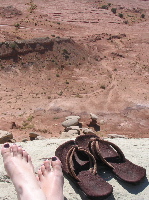Clouds, Clouds and More Clouds
I'm in the middle of a six night observing run at the MDM 2.4m telescope on Kitt Peak near Tucson, Arizona. This evening threatening clouds at sundown turned into enough lightning at the horizon to do a lightning shutdown—that is to say, after not bothering to open the dome and try to look at anything, I had the pleasure of shutting down the half dozen computers that run the telescope and its instruments, etc. as well as their UPS backup power supply. I've heard plenty of talk before of how annoying it is to be an astronomer on a cloud-covered mountain, but I always thought the irritation arose mainly from the lack of ability to take data, when in reality it's more like an irritation arising from the lack of anything to do. The last few nights have been cloudy off and on, but mostly with the patchy kinds of clouds that tease you as you chase for holes between them, or like last night when everything was beautiful and clear and we were efficiently going from one target to the next until around 1a.m. when in less than fifteen minutes the humidity rose by 10% and the sky became a thick blanket of white and we had to close up for the remainder of the night.
The run I am on is for "queue observing." The basic idea behind queue observing is that if a bunch of people have objects they'd like to have looked at once a night for a period of time, then they can combine resources and take turns observing all of the objects. In this case, "resources" are "graduate students who feel like getting some observing experience and perhaps their names on a paper or two." The main part of this queue observing run is to take spectra of supernovae for SDSS. SDSS is good enough at finding supernovae that, while they're looking (i.e., in the fall) there is always a list of supernovae to observe, and, unlike other kinds of transient objects (like gamma ray bursts), supernovae are generally bright for about two weeks.
This 2.4m telescope is, I believe, the largest in the world that does not have a regular night operator. That is, larger telescopes have a staff of people whose job it is to actually run the telescope: they open the dome and turn on the instruments and take the calibration images and make sure the telescope is pointed in the correct direction with high enough precision and is nicely focused and that everything is working nicely. Not so here. Here it's just me (well, there was another graduate student here the last three nights, but no staff at night), and so when it's actually safe to, you know, turn on the telescope, then I get to make sure that all of those things happen. The first night or two is usually hell because there are so many things to remember and it takes a while to completely nightshift and get used to the higher altitude and lower humidity; tonight is hell because there isn't anything to do and I didn't get up until 4pm so it's not like I can "just go to sleep."
Well, actually I did bring some DVDs from Netflix with me. I've already watched a disc of Lost and Buffy the Vampire Slayer (I've only recently started watching both shows). Seriously, all alone in the dark on an empty quiet mountain... I'm now surprisingly jumpy. And I'm not liking the forecast of it not clearing up until Tuesday night.


3 comments:
...USB backup power supply...
Universal Serial Bus? Do you mean UPS: Uninterruptible Power Supply?
D'oh! Of course I did, but my fingers are much more used to typing the other acronym. Fixed now though!
An issue at other, smaller scopes, is that the grad students aren't actually trained in how to use it. They often flounder around, and even decide to do data mining for their thesis work instead.
I've got a 0.25 meter telescope, and although there was significant resource margin available over and above the purchase price, it won't cover a night staff. The lens cap comes off if i feel like it.
UPS system? That reminds me. I've got to get another 9 volt battery for my scope's computer. At least it's portable.
Post a Comment